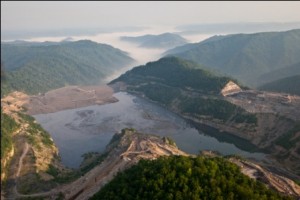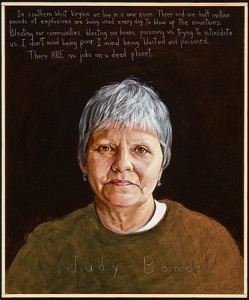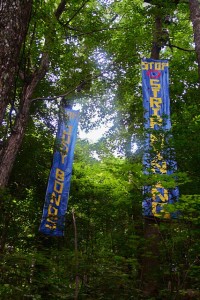
I love the smell of direct action in the morning.
Last week, I was part of Earth First! and Northern Rockies Rising Tide taking over the governor of Montana’s offices in protest of tar sands development, and this morning, the RAMPS Campaign put a couple of tree-sitters up on Coal River Mountain to stop mountaintop removal coal mining.
The tree-sit has stopped Alpha Natural Resources strip mining operations on Coal River Mountain. Catherine-Ann MacDougal and Becks Kolins currently are sitting in trees 80 feet off the ground about 300 feet from active blasting operations.
Their banners read “STOP STRIP MINING” and “FOR JUDY BONDS.”

Judy Bonds was an Appalachian leader in the anti-mountaintop removal fight who died of cancer earlier this year.
Judy’s daughter, Lisa Henderson, said in support of the tree-sit, “I hope that today’s actions serve as a symbol that the struggle to live peacefully and pollution-free in the Coal River Valley did not end when my mother’s life did. My mother and I often compared the fight to survive here on Coal River to the civil rights struggles of the 1960s. I am sure that generations from now, our children will look back on this movement also and the actions of the people involved, and ask the question of their elders, ‘Whose side were you on?’”
————————————-
FOR IMMEDIATE RELEASE
July 20th, 2011
Contact: Mathew Louis-Rosenberg, 304-924-1836
Activists Block Mining Operations on Coal River Mountain Call for end to strip mining in the Coal River Watershed
MARFORK, W.Va. – Two protesters associated with the RAMPS Campaign halted blasting on a portion of Alpha Natural Resources’ Bee Tree mountaintop removal mine on Coal River Mountain today by ascending two trees. Catherine-Ann MacDougal, 24, and Becks Kolins, 21, are on platforms approximately 80 feet off the ground within 300 feet of active blasting on the mine. The banners hanging from their platforms read “Stop Strip Mining” and “For Judy Bonds” in honor of strip mining activist Julia “Judy” Bonds of Packsville, W.Va. who died of cancer earlier this year. The activists demand that Alpha Natural Resources stop strip mining on Coal River Mountain and that the West Virginia Department of Environmental Protection prohibit future strip mining in the Coal River Watershed.
“I feel, with the keen urgency of extinction, that Alpha Natural Resources cannot be allowed to tear apart Coal River Mountain and allow all those living below it to suffer for their profits. The Coal River watershed cannot tolerate any more damage. There is no way that I can begin to detail the comprehensive destruction that surface mining and mountaintop removal wreak on the forest ecosystem of the southern Appalachian mountains,” said Catherine-Ann MacDougal.
Coal River Mountain is the last major intact mountain in the watershed, which encompasses roughly 570,000 acres in the heart of the southern WV coalfields. Nearly a quarter of total land area in the watershed is being mined or permitted to be mined in the future, including over 5,000 acres of Coal River Mountain. As of January 2011, Marfork Coal Company, a subsidiary of Alpha, has destroyed about 75 acres of Coal River Mountain on the Bee Tree permit, the only active mountaintop removal permit on the mountain. Activists say they are determined to prevent further strip-mining.
Elias Schewel, 27, and Junior Walk, 21, are supporting the sitters from the base of their trees. Walk, who grew up in Eunice W.Va. at the foot of Coal River Mountain says that he was inspired to take action, in part, by his lifelong relationship with Judy Bonds.
“The last two families to be driven out of this holler we’re in today were Judy Bonds and my great uncle and they both died of lung cancer. Judy spoke often about how hard it was to leave, but black water spill after black water spill, the blasting dust clouds, and fears for the health of her family forced her out. Packsville is gone. We’re not just losing our clean air and clean water. We’re losing our communities, our history, and our culture.”
Judy Bonds’ fears of the health impacts from coal operations have been increasingly backed up by research from WVU. A recent public health study found a correlation between residence in a mountaintop removal area and higher rates of birth defects, even accounting for other socio-economic factors(i). Public health research has linked residence in coal-impacted regions to increased rates of cancer, kidney disease, and some chronic illnesses, confirming long-held community concerns.(ii)(iii)
“Those who are drinking tainted water, breathing coal dust, and watching the mountains fall around them don’t need a scientific study to tell them what’s wrong,” noted MacDougal. Fellow tree sitter Becks Kolins remembers their first visit to the home of a Coal River Valley resident last year.
“He showed me his yearbook and pointed out everyone that had gotten cancer. The only teachers that hadn’t gotten cancer had made a point of not drinking the water.”
Lisa Henderson, Judy Bonds’ daughter and Coal River Valley resident, sees this action as a continuation of her mother’s work.
“I hope that today’s actions serve as a symbol that the struggle to live peacefully and pollution-free in the Coal River Valley did not end when my mother’s life did. My mother and I often compared the fight to survive here on Coal River to the civil rights struggles of the 1960s. I am sure that generations from now, our children will look back on this movement also and the actions of the people involved, and ask the question of their elders, ‘Whose side were you on?’”
RAMPS (Radical Action for Mountain People’s Survival) is a non-violent direct action campaign based in southern West Virginia dedicated to ending all forms of strip-mining in Appalachia. Ongoing updates about this action will be available at www.rampscampaign.org.
###
i M. Ahern, M. Hendryx, J. Conley, E. Fedorko, A. Ducatman, and K. Zullig, “The association between mountaintop mining and birth defects among live births in central Appalachia, 1996-2003” Environmental Research in press, 2011 ii N.P. Hitt, M. Hendryx, “Ecological integrity of streams related to human cancer mortality rates.” Ecohealth. 2010 Aug;7(1):91-104.
iii M. Ahern, M. Hendryx, ““Relations between Health Indicators and Residential Proximity to Coal Mining in West Virginia.” American Journal of Public Health, 2008.
—
